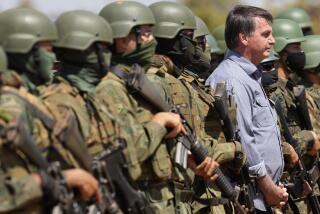‘Military Option’ to Sway Vote in E. Timor Went Awry
- Share via
JAKARTA, Indonesia — In the smoldering ruins of East Timor lies the legacy of a tragic miscalculation in March that the best way to influence the U.N.-sponsored election in the territory would be through a military, instead of a political, campaign.
That policy--decided upon by Indonesian military commanders in East Timor, according to Indonesian human rights activists--backfired at a cost of perhaps thousands of lives. And it served only to strengthen the voters’ resolve in the Aug. 30 referendum to support independence from Indonesia, political analysts say.
Many of these analysts believe that the autonomy package President B.J. Habibie offered the East Timorese as an alternative to independence was a good deal but, given the mutual distrust between the Indonesian government and a majority of the territory’s population, no one tried to sell voters on the benefits of continued association with Indonesia: more schools, better roads, increased economic development, local control of the territory’s internal affairs.
Commanders instead chose the military option. They drew up death lists of independence supporters, Roman Catholic Church sources say, recruited and supported unruly militias that were in effect little more than street gangs, and turned the militias loose to intimidate an electorate that had already been abused by the army for more than two decades.
For many voters, the real question on last month’s referendum was not, “Do you want independence?” but “Do you want the army out of East Timor?” More than 98% of registered voters braved death threats to answer that question at the polls, and of them, nearly 80% said “yes.”
“The independence side was the clear majority regardless,” a Western ambassador said. “But, if the military hadn’t opted for terror and intimidation, the vote might have been close, or at least closer, and autonomy supporters could have made a case, saying, ‘Look, East Timor is divided on this, and we need more negotiation.’ ”
Forming militias to help the Indonesian military has been done before. Despite protests from human rights groups, commanders threw together a force of 12,000 young men to police June’s national election, which was largely peaceful. But never before have militias run amok to the extent they have in East Timor, and never before has their chain of command been so murky.
Before East Timor’s election last month, the militias’ mission was intimidation; after the election, it was punishment. They targeted every perceived bastion of independence support: the Catholic Church, the United Nations, foreign and local journalists, the Timorese themselves. All hotels, restaurants and guest houses in Dili, the regional capital, that cater to U.N. workers and foreign journalists were destroyed.
“Peace? Why would we want peace?” Filomeno Orai, leader of a pro-autonomy militia set up with help from the Indonesian Foreign Ministry, told reporters before the election. “If the vote is for independence, we’ll just kill--kill everybody.”
Most of the 13 anti-independence militias operating in East Timor sprung up six or seven months ago as the autonomy-or-independence debate heated up. Untrained, ill-disciplined and often armed only with machetes and swords, the army’s surrogate foot soldiers received pay of $12 to $32 a month each, an attractive salary in the impoverished territory.
Strutting through the streets wearing red-and-white headbands--the colors of the Indonesian flag--their arrogance and cowardice became legendary. They swaggered and cursed, and many appeared to be drunk. Their targets were unarmed civilians. They attacked and killed as a gang, often while Indonesian soldiers and police officers stood idly by.
Three militias are among the most notorious formed by the army: Red and White Iron, operating from the village of Liquisa; Live or Die for Integration in Ainaro; and Aitarak in Dili, commanded by the baby-faced, longhaired Eurico Guterres, 29, who supported independence until switching sides in 1991.
Before the election, Guterres told a news conference in Dili: “If any forces are carrying guns in East Timor, I can guarantee it is not our forces. The violence is carried out by some third force, and I fully support the police’s pledge to confiscate weapons from anyone who carries them in public.”
After the election, with his forces killing, looting and burning in Dili, he said: “I am a son of East Timor, but also a son of Indonesia. I will fight to defend the 21% who voted to remain part of Indonesia.”
Some of the militias terrorizing East Timor have roots in paramilitary organizations that Indonesia set up after invading the former Portuguese colony in 1975. In them, patriotism and the belief that members are protecting their homes still linger. Other militias seem to have attracted a following motivated mostly by money, boredom or self-preservation because everyone in East Timor needs an armed protector.
Exactly what the militias hoped to accomplish, except more death and destruction, by continuing their rampage after the vote had gone overwhelmingly against them continues to puzzle political and military analysts. Some believe that the militias’ intent was to partition the western districts of East Timor, along with a corridor to Dili, and create an anti-independence entity that would remain with Indonesia. In many cases, the militias appear to have bought into their own propaganda, which maintained that their future had been stolen in an election rigged by the United Nations.
“We have to work together, but if that can’t be done and the international community does not review the vote process, we are ready to destroy everything,” Herminio da Silva da Costa, a senior militia official, told Agence France-Presse.
If security is restored--something that is more likely now that Indonesia has agreed to let an international peacekeeping force into East Timor and the U.N. has authorized its deployment--the militias may soon be out of business.
For most East Timorese, the thought of several thousand jobless militia members on the streets in a territory already beset by high unemployment is not an entirely comforting one. But most agree that the militias would quickly fade away as a threat if the Indonesian army, which is to work in conjunction with the U.N. peacekeeping force, withdrew or otherwise ended its support.
Whatever the militias’ eventual fate, their legacy will be to have given a huge boost to the independence side they were hired to defeat.
Said a Catholic nun in a now-destroyed Dili convent: “The violence and intimidation created more independence voters than you could dare imagine.”
*
* MILITIAS PULLING OUT
Anti-independence militias were leaving East Timor after U.N. decision to send a force. A4
More to Read
Sign up for Essential California
The most important California stories and recommendations in your inbox every morning.
You may occasionally receive promotional content from the Los Angeles Times.










